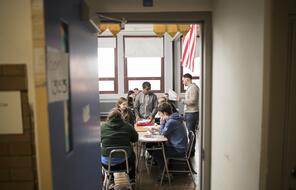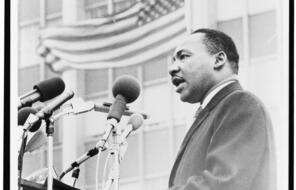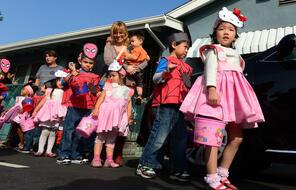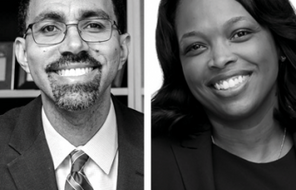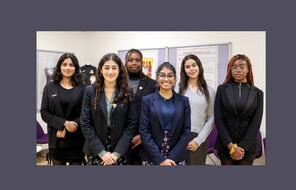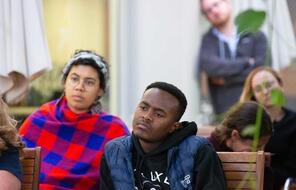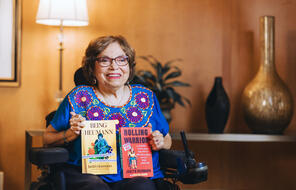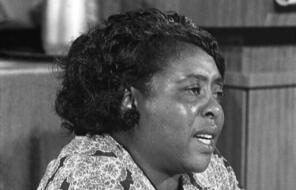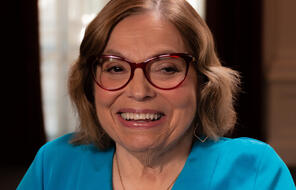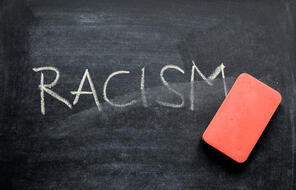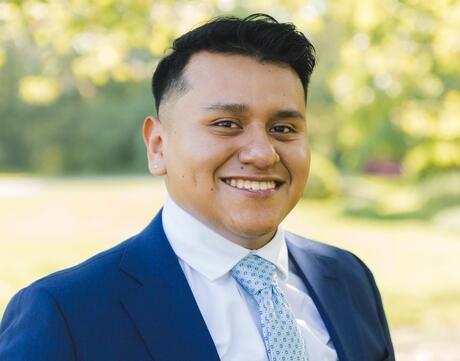
“Facing History taught me that we have to care for and empathize with others.”
My name is David Gomez, and it is an absolute pleasure to discuss the positive impacts that Facing History & Ourselves has had not only in my academic career, but also in my life.
I attended Animo Jackie Robinson Charter High School in South Central Los Angeles. Animo Jackie Robinson is a Facing History partner school, which means it is part of the curriculum and school culture at every level.
I have learned so much from this organization. To me, the most important lesson is this: it’s not enough to identify injustice—it’s important to also take action. That lesson has changed the course of my life. Facing History taught me that we have to care for and empathize with others. But that’s not where our responsibility ends. We can and should do more to try and fix what is causing pain in our communities.
For example, homelessness has long been an issue that affects me deeply. Every day we would see unhoused people living in tents outside our homes, supermarkets, even directly across from our school. If you live in Los Angeles, I’m sure you know what I’m talking about. My own family almost lost our home, and many in our community are one paycheck away from being homeless. The unjustness of homelessness, and my own personal experiences, drove my commitment to learn more about this issue. Of course there are a lot of institutional changes that need to happen to really assist our unhoused neighbors, but I felt that I too could do something to help.
Among the lessons of Facing History is understanding the difference between a bystander and an upstander. A bystander is someone who witnesses something happening but does nothing to intervene. An upstander is someone who sees something happening and takes action to stop it.
Facing History helped me understand that I could do something. This knowledge pushed me to find the courage to assist others. Supported by my Facing History teacher, Ms. Gonzalez, I founded the Feed the Need club at my high school. We organized clothing drives, built hygiene kits, and created shower facilities to help our unhoused neighbors. Most importantly: we worked to build empathy and understanding so that people could see that people who are unhoused are not a problem—or worse, invisible—but that they are members of the community who need an extra hand.
In our Facing History classes, we studied the stories and read first hand accounts of historical greats like Cesar Chavez, Tom Bradley, and Malala Yousafzai. The academic rigor of the Facing History curriculum helped open doors for me later on. After graduation I attended Georgetown University. It was a huge culture shock. I worried that I wasn’t prepared and that I didn’t deserve to be there. My biggest fear was that my voice didn’t matter. But then my lessons from Facing History came flooding back.
Academics alone didn’t shape me, though. I remembered what I had learned from the powerful journeys of people who chose to stand up and work for a better world—their stories echoed through my memories. I was reminded that my voice matters. And the message I want to give other people in my position: Your. Voice. Matters.
The reality is that all voices are needed in these spaces. When the conversation includes more people, not only can we dispel stereotypes, we can learn even more from others and their stories. Growing up, I watched my parents struggle financially and I wanted a job that would mean they would never have to struggle like that again. We need people who look like me in prestigious universities and in white collar industries where we are not represented. I now use my voice every day as a union representative, fighting for the dignity of working people.
As I learned through Facing History, “People make choices. Choices make history.” I had the opportunity to choose a more lucrative career path, but I know I’m making a positive impact in my community by fighting for strong contracts, worker protections, and fair wages. That’s the history I’m interested in making.
I’m incredibly grateful for the impact Facing History has made in my life, and I hope to pay that forward by making an investment in my community and beyond. I hope my words and experience with Facing History inspire others to join me.

